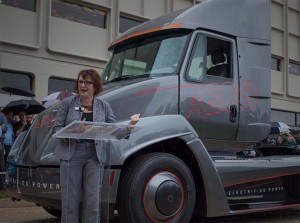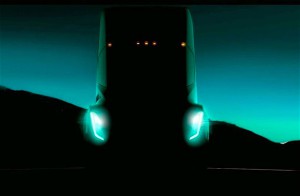
Tesla's not the only electric truck maker. Cummins unveiled its new urban electric concept aimed to take on Tesla.
While recent headlines have focused on the launch of the Tesla Model 3 sedan, the battery-carmaker has some bigger plans in the works – quite literally, as it gets ready to reveal its first heavy-duty truck later this month, with an electric pickup to follow.
Tesla also is working on ways to make its truck models autonomous, even fully driverless, which is expected to appeal to fleet and commercial users who want to cut costs.
It could turn into another major market for Tesla, but as it moves beyond its current niche in the electric passenger car and SUV segments it also could face some tough new competition from an assortment of traditional truck and powertrain manufacturers, such as Daimler, Ford and Cummins, as well as new start-ups like Bollinger and Workhorse.
Exactly what Tesla has in store it isn’t saying, though recent reports have suggested the heavy-duty truck it will reveal this month will deliver a range of somewhere between 200 and 300 miles per charge. That’s well short of the nearly 1,000 miles per fill-up long-haul diesel trucks can manage, though Sandeep Kar, chief strategy officer of Toronto-based consulting firm Fleet Complete notes that would still be enough to handle 30% of the nation’s trucking, typically between ports to hubs and from regional hub to another.
(Tesla’s EV semi likely to fall short of long haul norms. For the story, Click Here.)

Set to be revealed this month, Tesla's new semi-truck is expected to get between 200 and 300 miles on a single charge.
For that sort of work, however, Tesla may face a strong challenge from Indiana-based Cummins, a company already well known for its diesel and natural gas truck powertrains. Last week, the 98-year-old company rolled out a Class 7 concept it dubbed the Urban Haul Tractor. The electric truck is similarly targeting users who need to transport finished goods and raw materials in urban areas, typically clocking around 100 miles a day.
“We will harness our global technical footprint to continue to develop a wide variety of power technologies to bring our customers the choice and solutions that enable their success and contribute to a sustainable future,” said Jennifer Rumsey, Cummins’ chief technical officer.
A number of other players are exploring the market for electric trucks, including Daimler AG, which is developing models for several of its five different truck brands. That includes Fuso, which hopes to go into production by 2019 with the eCanter, a light duty model expected to have a range of around 60 miles. The Mercedes Truck brand is working up a heavy-duty distribution truck based on the Urban eTruck concept that will share a lithium-ion battery pack developed for a hybrid version of the Mercedes Citaro urban bus.
Meanwhile, Salt Lake City, Utah-startup Nikola Motors is taking an alternative approach to zero-emissions trucking. It hopes to be in production in a couple years with two heavy-duty trucks powered by hydrogen fuel cells. These would match, even exceed, the range of conventional long-haul rigs, at 1,200 miles per tank.
While there are even fewer hydrogen pumps than electric charging stations in the U.S., Nikola plans to set up a network of its own refueling centers across the country and will include the price of fuel in the cost of its Nikola One and Two trucks.
On the pickup side, Tesla will face plenty of competition, as well, especially from start-ups such as Workhorse, which recently unveiled its W15 plug-in hybrid truck. Scheduled to go into production in 2018, it will be powered by a pair of electric motors, one on each axle, making 460 horsepower and capable of launching from 0-to-60 mph in 5.5 seconds. While the all electric range isn’t great – just 80 miles – it’ll exceed 300 miles when the gas motor fires up, the company claims.
(Click Here for details about the NLRB filing charges against Tesla.)
Then there’s New York-based Bollinger Motors, which in July unveiled what it is billing as the world’s first on- and off-road “sport-utility truck.”
“This is the culmination of what has been a 40-year-long boyhood dream of mine, and I couldn’t be more pleased with the vehicle and the incredible team who worked so hard to create it,” said company founder and CEO Robert Bollinger.
Resembling an old Ford Bronco, the SUT will be offered with a choice of lithium battery packs, the larger one capable of yielding 200 miles per charge, Bollinger claims. Production could begin, the company added, within two years.
Then there is Ford, the Detroit automaker hinting that it may have a number of new electrified vehicles in development. Whether any of those will be trucks isn’t certain but the maker has hinted it may take that approach when, in 2021, it is scheduled to introduce its first fully driverless vehicle.
Ford this month launched a pilot project with Domino’s pizza that has the fast food chain using a small fleet of autonomous Ford Fusion vehicles to deliver its trademark pies to customers in Ann Arbor, Michigan.
And Sherif Marakby, Ford’s vice president of autonomous vehicles and electrification, told the Reuters news service it is talking to “many other companies” that would like to go fully driverless as soon as possible.
While Ford doesn’t make heavy-duty trucks it is the largest maker of pickups in the U.S., and it has both the light- and medium-duty Transit Connect and Transit vans that could be outfitted with its self-driving technology. It is also experimenting with fully electric versions of those vans.
(Tesla’s had trucks in the portfolio plan for some time. For the story, Click Here.)
So, while Tesla may generate some headlines when it rolls out its autonomous electric heavy-duty truck this month, it could soon face plenty of competition.
